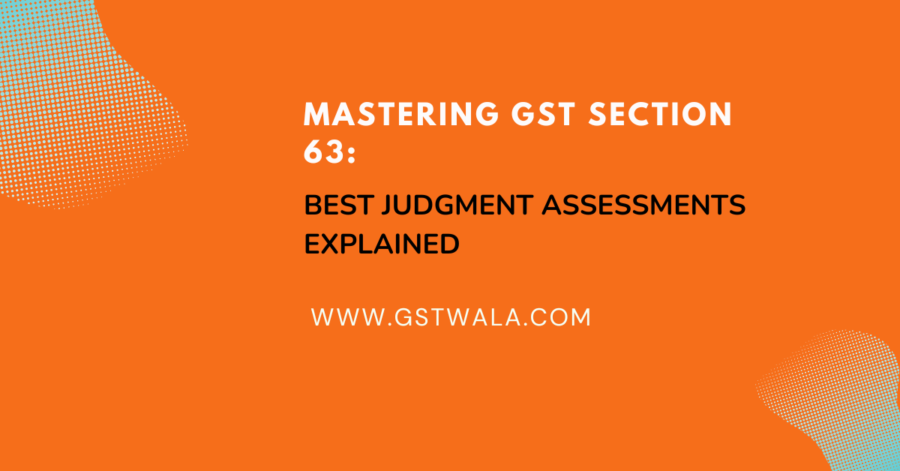
Mastering GST Section 63: Best Judgment Assessments Explained
Welcome to GSTwala.com, your go-to destination for demystifying the complexities of GST. In this comprehensive guide, we’ll delve into the intricacies of Section 63 of the Central Goods and Services Tax Act, 2017, shedding light on best judgment assessments for unregistered or cancelled registrations. From understanding the fundamentals to navigating the appeal process, we’ve got you covered.
Unveiling Section 63: A Deep Dive into Best Judgment Assessments under GST Section 63 of the Central Goods and Services Tax Act, 2017, holds significant importance in conducting best judgment assessments for entities falling under the categories of unregistered or cancelled registrations. Let’s break it down:
Understanding Section 63: Section 63 empowers tax authorities to conduct best judgment assessments when there’s a liability to pay tax for individuals or entities not registered under GST or whose registration has been cancelled.
Key Points of Section 63:
- Liability to Pay Tax: Applies when there’s a tax liability due to non-registration or cancelled registration.
- Best Judgment Assessment: Authorizes proper officers to assess tax liability using available information and judgment.
- Time Limit: Specifies a five-year period from the date specified under Section 44 for furnishing the annual return related to the unpaid tax.
Example Illustration: Consider XYZ Electronics, a small business not registered under GST. They fail to file the annual return for the financial year 2020-2021, resulting in tax liability. Section 63 allows tax authorities to conduct a best judgment assessment within five years from the specified return filing deadline.
Key Takeaways:
- Section 63 facilitates best judgment assessments for tax liabilities of unregistered or cancelled registrations.
- Assessments are based on available information and proper officer judgment.
- Time limit ensures timely resolution of tax liabilities.
Rule 100(2): Providing Time for Reply to Notices Rule 100(2) under the CGST Rules, 2017, deals with the issuance of notices of assessment under Section 63 and outlines the timeline for registered persons to reply. Let’s explore:
Understanding Rule 100(2): Rule 100(2) mandates that registered persons must be allowed fifteen days to reply to notices of assessment issued under Section 63.
Key Points of Rule 100(2):
- Assessment under Section 63: Applies when conducting best judgment assessments.
- Notice Issuance: Requires proper officers to issue notices of assessment.
- Time for Reply: Stipulates a fifteen-day period for registered persons to respond to notices.
Example Illustration: ABC Traders, a registered taxpayer, receives a notice of assessment under Section 63. The notice specifies their tax liability and grants them fifteen days to reply.
Key Takeaways:
- Rule 100(2) ensures registered persons have a fair opportunity to respond to assessment notices.
- Fifteen-day period allows for the submission of clarifications or additional documentation.
Appeals: Section 107(1) and Rule 108 Section 107(1) of the CGST Act, 2017, and Rule 108 of the CGST Rules, 2017, outline the timelines for filing appeals against decisions or orders. Let’s delve into the details:
Understanding Section 107(1) and Rule 108:
- Section 107(1) allows aggrieved persons to file appeals within three months from the date of communication of decisions or orders.
- Rule 108 provides procedural guidelines for filing appeals, including required documents.
Key Points:
- Aggrieved Person: Refers to individuals dissatisfied with decisions or orders.
- Timeline for Appeal: Specifies a three-month period for filing appeals.
- Procedural Requirements: Outlines documentation and appeal filing procedures.
Example Illustration: ABC Ltd. receives an adverse assessment order and has three months to file an appeal against it, adhering to the procedural guidelines outlined in Rule 108.
Key Takeaways:
- Section 107(1) and Rule 108 ensure a structured and timely appeal process.
- Adherence to procedural requirements is essential for filing appeals effectively.
Section 107(2): Officer’s Authority to File Appeals Section 107(2) grants tax officers the authority to file appeals against decisions or orders they believe are incorrect. Let’s explore its implications:
Understanding Section 107(2):
- Section 107(2) allows officers to file appeals within six months from the date of communication of decisions or orders.
Key Points:
- Officer’s Appeal: Enables officers to challenge decisions they consider incorrect.
- Timeline for Officer’s Appeal: Grants a six-month period for officers to file appeals.
Example Illustration: Upon discovering discrepancies in a refund claim, a tax officer files an appeal against the decision within six months from the date of communication of the assessment order.
Key Takeaways:
- Section 107(2) empowers tax officers to contest decisions deemed incorrect.
- Timely filing of appeals is crucial for addressing discrepancies effectively.
Section 107(4): Granting Additional Time for Appeals Section 107(4) allows appellate authorities to extend appeal filing deadlines under specific circumstances. Let’s examine its significance:
Understanding Section 107(4):
- Section 107(4) permits appellate authorities to grant an additional one-month extension for filing appeals.
Key Points:
- Sufficient Cause: Requires a valid reason justifying the need for an extension.
- Additional Time: Grants an extra month beyond the original appeal filing deadline.
Example Illustration: In cases of unforeseen circumstances like illness or natural disasters, appellate authorities may grant a one-month extension for filing appeals.
Key Takeaways:
- Section 107(4) provides flexibility in appeal filing deadlines under exceptional circumstances.
- Appellate authorities assess requests for extensions based on the merits of each case.
Conclusion: Mastering GST Section 63 and related provisions is essential for navigating best judgment assessments and appeal processes effectively. By understanding these nuances
Stay ahead of the curve with gstwala.com; Together, let’s simplify GST for a smoother business journey. We are just a click away info@gstwala.com
